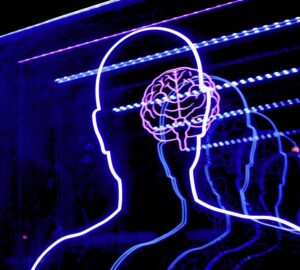In a recent study published in the journal Scientific Reports, researchers dove into the connection between past psychedelic use, metaphysical beliefs, and overall well-being. What they found was that those who use psychedelics are more inclined to embrace metaphysical idealism, or a belief that consciousness lies at the heart of reality. This perspective, researchers say, is associated with greater psychological well-being, PsyPost reports. Other metaphysical beliefs, such as “other non-materialist views,” did not show a similar relationship, however.
The report states that psychedelic substances, such as psilocybin, LSD, and DMT, are known to shift people’s perceptions, alter cognition, and induce spiritual experiences. The latter often leaves people in a state of significant wonder, leading them to question the fundamental aspects of reality. A plethora of previous research shows that spiritual experiences can result in long-term benefits, including improved general well-being and a reduction of symptoms associated with depression and anxiety. But science still hasn’t articulated the mechanism that drives these metaphysical shifts.
That’s what researchers essentially looked at in this study. They wanted to understand whether psychedelic experiences prompted a shift in non-materialist metaphysical views, such as idealism, which the researchers defined as the notion that “consciousness is fundamental to reality,” or panpsychism, which is defined in the research as “consciousness exist[ing] in all things.”
READ: CEO of Psilocybin Mushroom Company Is Arrested for Alleged Stock Fraud
“It is a common assumption that psychedelics can facilitate spiritual-type awakenings or insights about the nature of reality, which could alleviate suffering,” said study author Jussi Jylkkä, a senior researcher at Åbo Akademi University, to PsyPost. “For example, consider a person with a materialistic-nihilistic worldview, who holds that everything is ultimately dead matter without purpose or value. If that person starts to believe that the nature of reality is, for example, loving consciousness, it is intuitive that it could lead to better psychological wellbeing.”
Jylkkä told PsyPost that the Western approach to psychological wellness typically ignores spiritual and existential dimensions, focusing mostly on clinical and material facets of mental health. The goal of this study was to explore what type of metaphysical ideas, or conceptions of the nature of reality, were associated with using psychedelics and if they are actually linked with well-being.
To gather data, researchers gathered 701 participants who all had prior experience with classical psychedelics — mescaline, LSD, psilocybin mushrooms, and DMT — and had them complete a questionnaire through an online platform. Each participant answered questions involving their psychedelic use, metaphysical beliefs, and psychological well-being.
Researchers found that participants who used psychedelics more frequently were more inclined to embrace metaphysical idealism or the belief that consciousness is the essence of reality. Interestingly, this shift in beliefs wasn’t observed with other metaphysical views, such as materialism, which holds that reality is purely physical, or dualism, the notion that the mind and matter are distinct entities.
Most notably, the researchers found that idealism acted as a bridge between past psychedelic use and well-being. That means people who frequented the psychedelic realm were more likely to endorse idealism, which predicted their higher well-being.
“Based on our results, psychedelic experiences could facilitate the idealistic belief that some type of loving consciousness is the fundamental nature of reality,” Jylkkä told PsyPost. “Endorsement of this idea was also linked with better psychological well-being. The results are in line with the hypothesis that psychedelics could alleviate suffering through spiritual-type transformations. However, it is important to notice that the effects were not strong and that there are several other factors besides worldview changes that are also important, such as increases in mindfulness capacity or psychological flexibility.”
READ: Dennis McKenna Is on a Mission to End the Prohibition of Coca
The study pointed out that while idealism significantly connected psychedelic use to well-being, other metaphysical beliefs, like materialism, showed no such association. This suggests that not all shifts in metaphysical perspectives have the same effect on mental health. The findings also suggest that psychological insights were more strongly tied to idealism than mystical experiences, such as feelings of oneness with the universe or a sense of sacredness, highlighting the specific role of psychological insight in shaping metaphysical beliefs.
There are a few caveats, however. For one, the self-reported data creates an issue with establishing cause-and-effect conclusions from the findings. The researchers still don’t understand the relationship between idealism and wellbeing and why it enhances mental health.
Spiritual transformations may increase the lasting impact of psychedelic experiences, researchers say, although they’re not the sole route to psychological benefits. Researchers stressed that psychedelics can elicit a range of experiences — both good and bad —and underscored the need for responsible use to reduce potential harms and risk.
DoubleBlind is a trusted resource for news, evidence-based education, and reporting on psychedelics. We work with leading medical professionals, scientific researchers, journalists, mycologists, indigenous stewards, and cultural pioneers. Read about our editorial policy and fact-checking process here.
DoubleBlind Magazine does not encourage or condone any illegal activities, including but not limited to the use of illegal substances. We do not provide mental health, clinical, or medical services. We are not a substitute for medical, psychological, or psychiatric diagnosis, treatment, or advice. If you are in a crisis or if you or any other person may be in danger or experiencing a mental health emergency, immediately call 911 or your local emergency resources. If you are considering suicide, please call 988 to connect with the National Suicide Prevention Lifeline.
DoubleBlind Mag Read More



